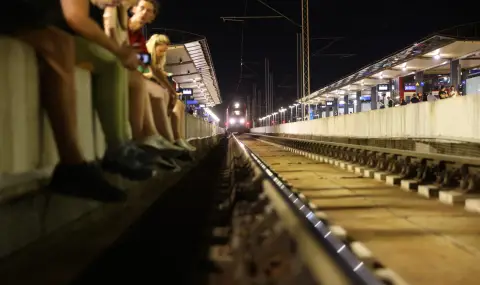Masha Petrovna and Galya Zinovieva are friends from kindergarten and do not want to change their habits, despite the fact that they are in a foreign country and do not speak the local language.
Their usual walk takes place along the central streets of Belgrade in conversation in their native Russian, BTA specifies.
They say that they were forced to emigrate and this is a big enough change, and therefore they do not want to change anything else from their usual way of life.
The two Russian women run a jewelry boutique in Old Belgrade and, like the hundreds of thousands of Russian citizens who left Russia after the start of the war in Ukraine, are waiting for the war to end and for them to return. Or move once again to another country, but on the territory of the Old Continent.
According to data from the Serbian Ministry of Internal Affairs, there are over 220 thousand Russian citizens in the country.
A large part of them have their own businesses and have settled here with their families.
Masha and Galya's granddaughters go to Serbian schools and help in the manicure salon opened by a close family, also Russians.
"If someone who speaks Serbian or English signs up at the salon, they call the children to help with the translation. But this happens very rarely, because we have an established clientele of our compatriots," says Masha.
"You could say that the Serbian language is easy for us!", explains Pyotr Isaev, who is a computer specialist and has been in Serbia for 10 years. He left Russia after the annexation of Crimea.
Because of his work for an international company, Isaev still speaks more English with his colleagues, including the Serbs in the office. But his young daughter still doesn't know the local language because she attends the "First Art Kindergarten" in the center of Belgrade, also owned by Russians.
"The integration of Russians into Serbian society is almost imperceptible, and at the same time, you can very often meet Russian speakers in Belgrade and Novi Sad or in the villages of Vojvodina," says Ivana Curic, owner of a language school for foreigners.
"Russians in Serbia have their own world. "There are many Russians in Belgrade who have opened restaurants where... Russians go," Isaev explains.
According to the Serbian Chamber of Commerce, over 11,000 Russian companies have been registered as of the beginning of 2022, with most of them engaged in programming, trade, consulting and catering.
The data shows that the process of moving Russian citizens to Serbia remains constant.
As early as 2022, the local and European press called this process a “Russian invasion”, especially due to the increase in property purchase and rental transactions, as well as the granting of Serbian citizenship to Russians.
In 2023 The European Commission recommended that local authorities not implement a fast-track citizenship procedure precisely because of the large number of Russians who would endanger the Schengen area if they held a Serbian passport. In its statement at the time, the Commission pointed out that Serbia, as an EU candidate country whose citizens travel visa-free in Schengen, must establish stricter rules towards Russia, otherwise it may lose the visa-free regime for its own citizens.
Today, Masha Petrovna and Galya Zinovieva will take their usual walk through the streets of Belgrade and on the way home they will buy ice cream to celebrate the New Year. Only Putin's face, which is visible from the gift pairs of socks displayed on the central square in the Serbian capital, can briefly take them out of the parallel Russian world in which they have been living for 2 years.
In March of this year, 512 voters out of a total of 4,726 Russian citizens in Serbia with the right to vote voted for the re-election of President Vladimir Putin.
The most votes went to the deputy chairman of the lower house of the Russian parliament, Vladislav Davankov, from the "New People" party - 3,185. Putin received 2% from the section at the Russian embassy in Belgrade.
